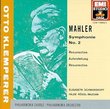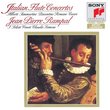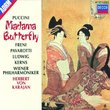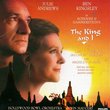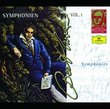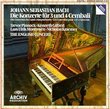| All Artists: Richard [Classical] Wagner, Wilhelm Furtwängler, Vienna Philharmonic Orchestra, Philharmonia Orchestra of London, Berlin Philharmonic Orchestra, Kirsten Flagstad Title: Wagner: Extracts from the Operas Members Wishing: 0 Total Copies: 0 Label: EMI Classics Release Date: 1/11/2005 Genre: Classical Styles: Opera & Classical Vocal, Historical Periods, Modern, 20th, & 21st Century Number of Discs: 2 SwapaCD Credits: 2 UPC: 724358619126 |
Search - Richard [Classical] Wagner, Wilhelm Furtwängler, Vienna Philharmonic Orchestra :: Wagner: Extracts from the Operas
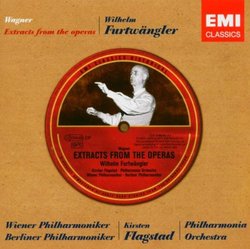 | Richard [Classical] Wagner, Wilhelm Furtwängler, Vienna Philharmonic Orchestra Wagner: Extracts from the Operas Genre: Classical
|
Larger Image |
CD DetailsSimilarly Requested CDs |
CD ReviewsSublimity for the Ages boldsworthington | Washington, DC, United States | 07/24/2005 (5 out of 5 stars) "In a strange way, one almost needs to have known these recordings in their previous incarnations to appreciate the miraculous transparency that EMI engineers have achieved in this latest transfer. Having long treasured these performances on LP and their first CD transfer (1993), I was stunned by the immediacy, power, and splendor of the sound. What a jaw-dropping revelation! Who ever dreamt of tracing so many more threads in these complex orchestral tapestries via these classic interpretations? As for the performances themselves, there are none better -- and there never will be. The only equally sublime Wagner excerpts are also in monophonic sound: check out the superb set of Stokowski's Wagner with the 1920s-40s Philadelphia Orchestra on Andante. Both conductors give us a kind of musicmaking that no one before or since has touched in this repertoire. And within the technical limitations of the times, the recordings admirably capture Wagner's sumptuous sound. No, the decibel level will not knock you out of your seat. If you want that kind of displacement, you must naturally seek a more recent recording. But grandeur is not merely a function of decibels, and on this recording and Stokowski's you will hear a level of rapport with Wagner's deepest impulses, a grandeur of conception, and a quality of orchestral execution that come through loud and clear as they do nowhere else. Remember, many musicians playing in these recordings studied under Wagner's contemporaries (indeed, in the earliest recordings of both conductors, we are probably even hearing a few people who were children or teenagers during Wagner's final years). As a result, these players absorbed the spirit of the age with their every formative breath. Through these recordings, they effortlessly project intangible qualities to which no later generations can ever lay claim. My own personal favorites here are the *Lohengrin* Prelude (boasting some of the most ethereal high-string sonorities ever recorded, courtesy of the Vienna Philharmonic -- a pure and perfect evocation of spiritual light descending from on high), the *Tristan* selections, Flagstad's grandly voiced Immolation Scene, and the incomparable *Parsifal* Prelude. *Parsifal* has never been my favorite Wagner opera, but its Prelude easily ranks among the chief glories of music. Never has it sounded more ravishing than it does here, with Furtwängler's patient and probing baton guiding Berlin's flawless execution (oh, those shimmering string tremolos!). These are just a few personal high points. In reality, nothing falls below superb here -- and the new transfers put us closer to the music than ever before (to mix in a bit of Richard Strauss, Salome has dropped another sonic veil; will the engineers find a way to make her drop still another in the next decade?!). If you want a direct route to the heart of Wagner, this EMI anthology and Andante's five-disc Stokowski set are the royal road to Wagner's kingdom of bliss. I urge you to make the journey." The best collection of Wagner excerpts from Furtwangler Santa Fe Listener | Santa Fe, NM USA | 12/16/2005 (5 out of 5 stars) "In the post-war era Furtwangler left us two Ring cycles from Italy (both very scrapy in execution), a classic Tristan from London, and a somewhat disappointing (to me, at least) Die Walkure from Vienna. Those represent the bulk of his Wagner conducting, since he didn't record many excerpts. This classic EMI set gathers together two hours wroth from 1938 to 1954. Other reviewers have extolled the 2004 remastering, which I compared to the original 1993 "References" release. I didn't hear a revelatory transformation, but it's helpful to have any sonic improvement, particularly in the muzzy early recordings from Berlin. The Gramophone declared that these excerpts validated Furtwangler's position as the greatest of all Wagner conductors. In their musical depth and emotional wisdom it's hard to disagree, although newcomers may find the tempos too braod, and the orchestral execution is never razor sharp--Furtwangler showed little interest in that. I think the touchstones would be the opening Tannhauser Over. from 1952, which is in the best sound, and the Tristan Prelude from 1938, which is in the worst. Both draw us into Furtwangler's hypnotic way with Wagner, weaving a complete emotional experience that overarches mere details and passing events. I find it easy to listen past the dated sound; these are readings to sink into for a lifetime. (My only reservation is that Flagstad's Immolation scene from Gotterdammerung, recorded in 1952 when she and Furtwangler made their famous Tristan, seems grand without much regard for specific words or emotions.) By now the Furtwangler canon has been scoured for more Wagner, and there is a live postwar collection in comparable sound from Testament that serves as the natural mate to these priceless studio recordings. Every scattered performance has been catalogued in the late John Ardoin's invaluable book, "The Furtwangler Record."" Wondrous Wagner Michael B. Richman | Portland, Maine USA | 06/09/2005 (5 out of 5 stars) "In this era of limited edition, out-of-print and rapidly disappearing classical CDs, sometimes it is better to wait and see instead of immediately buying a given title. Case in point, these famous Furtwangler recordings of Wagner extracts from the Operas, which have been available for years as a costly import in the EMI "References" series. I struggled off and on for some time about whether or not to buy it, knowing that these are among the very best Wagner performances ever committed to disc (despite their mono sound), but not wanting to pay an arm and a leg for them either. Well now with this inexpensively priced reissue in EMI's "Historical" Series, I can get the best of both worlds. Furtwangler's renditions, made with both the Vienna and Berlin Philharmonics between 1949 and 1954, are absolutely fantastic. This is the conductor at his very best, and there are few rivals in this material, even in stereo. In particular, the Tannhauser Overture, Lohengrin Prelude, and Tristan and Parsifal selections are magical. For price and performance, this CD is without peer."
|

 Track Listings (6) - Disc #1
Track Listings (6) - Disc #1